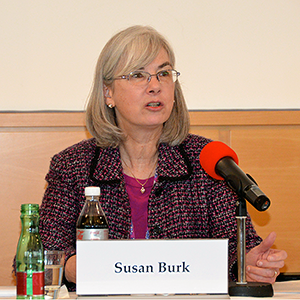

On 29 January 2015, VCDNP hosted a seminar by United States Ambassador (ret.) Susan Burk on the Treaty for the Non-Proliferation of Nuclear Weapons (NPT) Review Conference (RevCon). Ambassador Burk reflected on her experience at three of the NPT RevCons, including the latest, 2010 Review Conference, and discussed what she expected to be "the challenges the parties face at the upcoming NPT Review Conference as well as the opportunities they have to meet those challenges."
Ambassador Burk, in her personal capacity, first outlined a number of developments and challenges from the past that she predicts will shape the discussion at the 2015 NPT RevCon, and then provided a number of potential ways to address some of the challenges.
Looking Back
While Ambassador Burk highlighted the significance of the treaty's near universal adherence, she also reflected on the many lingering fundamental dilemmas that the treaty has not overcome: the spread of nuclear weapons and the risk of a nuclear attack due to an accident, unauthorized use, nuclear terrorism, or escalation of regional conflicts. Additionally, Ambassador Burk pointed to challenges that those who wrote the NPT in the 1960s did not anticipate, including: the abuse of the withdrawal provision, noncompliance, and the sale of sensitive materials on the black market.
Ambassador Burk shared her perception of the NPT RevCon process as "maturing," and while there remain sharp differences in the way to achieve the NPT's goals, there seems to be more interest in finding common ground. She attributed this interest to the following factors: the collective support for the NPT, the 1995 decision to extend the treaty indefinitely, recent international developments that demonstrated the dangers of noncompliance, the nuclear weapon states' (NWS) increased efforts to reduce their arsenals and increase transparency, growing appreciation for the role the NPT plays in the pursuit of peaceful uses for nuclear energy, "widespread recognition that the three NPT 'pillars' of disarmament, non-proliferation, and peaceful use represent mutually reinforcing, not competing interests," greater acceptance that the responsibilities of the NPT are shared, and finally the widespread acceptance "that while the NPT is not perfect and its core objectives have not been realized perfectly, it is the essential foundation of the global non-proliferation regime."
While many claim the 2010 NPT RevCon "reset the NPT," Ambassador Burk acknowledged that it did not solve all of the NPT's problems. It did, however, provide an "Action Plan" as part of the consensus Final Document, which allowed the state parties to construct a brief blueprint for necessary steps to be taken towards strengthening the NPT.
Looking Forward
Ambassador Burk emphasized the potential for building on the 2010 Action Plan and predicted that doing so will pave the way for success in 2015. On this note, she advised that when members of the treaty attempt to reach a consensus on all issues they risk "losing valuable work where an agreement has been reached." This can be avoided by following a similar process as that of the 2010 NPT RevCon, by agreeing to try to produce one document, the Action Plan, which is reached via consensus while also producing a final document that reflects not just consensus agreements, but also all other proposals in order to reflect the reality of the discussion.
On the issue of nuclear disarmament, Ambassador Burk recognized that there is considerable "unfinished business" such as the entry-into-force of the Comprehensive Nuclear Test-Ban-Treaty and the successful negotiation of a Fissile Material Cut-Off Treaty. She also recognized the progress the NWS have made, such as the continued implementation of the New Strategic Arms Reduction Treaty, the reduction by the United States of 85% of its nuclear weapons since 1967, the US creation of the International Partnership for Nuclear Disarmament Verification, and the NWS' "unprecedented process of annual meetings to strengthen [NWS'] engagement" to disarm.
Ambassador Burk cautioned the need for patience on the side of the non-nuclear weapon states. She recognized that the "step-by-step" process the NWS have adopted may be progressing more slowly than desired, though the progress made to date, she argued, is not insignificant, and "should not be dismissed." She also cautioned that the prospect of a nuclear weapon convention negotiated without the participation of the NWS leaves little reason to believe it can produce nuclear disarmament. She recommended instead the pursuit of additional "building blocks," as described in some NPT preparatory committee working papers, to be concluded in parallel with the step-by-step approach to disarmament.
Ambassador Burk raised the issue that, unlike other arms control and non-proliferation treaties, the NPT does not contain a "specific treaty provision for dealing with cases of noncompliance." Ambassador Burk stressed that it is essential to address the overall challenges presented by noncompliance and to recommit politically and economically to support the International Atomic Energy Agency safeguards program. She posited that "if the NPT parties are unable to express concern about activities by Treaty partners that undermine the goals of their treaty, and recognize the need to hold those partners accountable," then who will?
Finally, Ambassador Burk addressed the Middle East conference on a potential weapon-of-mass-destruction-free zone. She acknowledged that it did not adhere to its planned timeframe, and that convening such a conference is certainly not an easy task. She expressed optimism over the engagement between Israel and the Arab states and the need for the regional states and conveners (the United States, United Kingdom, and Russia) to report to the 2015 NPT RevCon on progress that has been made and what remains to be done.
Ambassador Burk ended her seminar by stating she is an optimist and that it "is time for the parties to 'break the curse'" that an unsuccessful RevCon follows a successful one.
